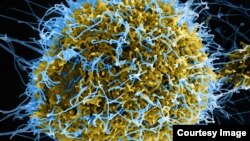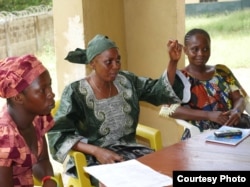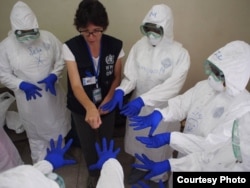Some eight months into the Ebola epidemic, researchers and frontline healthcare workers are starting to confirm some suspicions about how this little-studied pathogen works.
Two new studies shed more light on why some people who become infected get very ill and die, and others are only mildly affected – or not at all.
Recently, officials started using the word “cured” to describe some who have survived the disease.
But we wondered this: experts say we have no cure – or vaccine – for Ebola. So why have these survivors been declared cured?
To answer this and other questions, we talked to two experts: Dr. David Moore, a professor of infectious diseases and tropical medicine at the London School of Hygiene & Tropical Medicine. And virologist Christopher Basler, a professor of microbiology at Mount Sanai Hospital in New York City.
VOA: Can someone be cured of Ebola, a disease for which experts say there is no cure?
Moore: “Yes. All survivors who become well again have cleared the infection. This is what is meant by ‘cured.’ It is not the effect of a specific anti-viral treatment, but rather the description of the outcome of the infection.”
Basler: “I think it's clear that the immune system eventually clears the infection. [But if you] mean that some medical intervention that causes the virus to go away, we don't have a specific therapy that targets the virus.”
VOA: Can the Ebola virus lie dormant in someone who has been infected?
Moore: “There is no dormant state.”
Basler: "There's no evidence that the virus will reactivate and cause disease again…no one has ever had a recurrence of illness after a significant period of time. So the assumption is at this point when you can no longer detect the virus in the blood and the person seems healthy that they are past the point where they're going to have disease from that particular infection.”
VOA: Are there different strains of the Ebola virus?
Basler: “Yes. Within the Ebola viruses, there are five so-called 'species.'
“The one that is causing the outbreak now [in West Africa] used to be called Zaire Ebola virus because of where it was first discovered in 1976. Now it's called just Ebola virus. But that tends to be the deadly form of the virus.
“After the Zaire, there's the Sudan virus, the Bundibugyo virus, which is the one that was discovered in Uganda. [There’s] something that's now called Thai Forrest virus and then Reston virus, which is a little bit different. “Reston virus is the one that doesn't seem to cause disease in people as far as we know.”
VOA: Could a person who is no longer testing positive for Ebola become infected with a different strain?
Moore: “The answer is that we don't know. However, the likelihood of two outbreaks due to two different strains occurring at the same time in the same place is vanishingly small.
“We do believe that survivors of infection have some protective immunity after recovery, at least against the strain with which they were infected. This is the basis for the plasma therapy that is going to be trialed. But we do not know for how long such protection might last.”
VOA: This pathogen is considered a very "smart" virus among researchers. Why?
Basler: "The way I think about how the virus causes disease is that there are at least two big components.
“One is that it's very good at block[ing] or defeating a host's immune response. So the immune responses that we have that are basically there to control infections are very effectively suppressed by several of the viral proteins. That suppressing [of the] anti-viral immune response allows the virus to spread throughout the body and grow to very high levels.
“And the other remarkable thing about the virus from my perspective is that it doesn't come from people, it's a zoonotic virus. It probably comes from bats and then occasionally finds its way into the human population.
“In the bat, as far as we know, it doesn't cause any disease. So in some respects you can say the virus is very smart because it can defeat the human immune response. But whatever is involved in bats, it doesn't lead to disease. And so it's an unfortunate accident of what it does to people."
VOA: Is it possible that this virus will become airborne?
David Moore: “To suggest Ebola could become airborne is unhelpful speculation. There is no precedent for any virus mutating in this way, and nothing in the epidemiology so far that gives even a hint that airborne spread has ever occurred.
“Viruses make errors in their RNA when they replicate. These errors are called mutations and are part and parcel of being a virus. Sometimes they are so important that they weaken the virus so it becomes less able to infect or to replicate. But mutations that make a virus easier to transmit by the airborne route are biologically very difficult to conceive…its not going to happen.”






